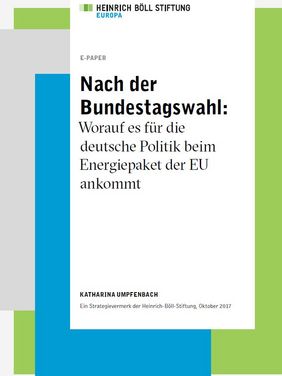After the Elections: What matters for German policymakers in the EU's energy package

The EU is currently negotiating a comprehensive reorientation of energy and climate policy for the decade 2020-2030. In this strategy brief, Katharina Umpfenbach discusses how the next German federal government can shape the EU negotiations so as to create an EU electricity market regulation that is conducive to the German energy transition.
Four central elements are identified: raising the ambition of energy targets and introducing long-term targets, developing effective oversight instruments to ensure compliance, adjusting the electricity market to the needs of wind and solar power, and initiating an exit strategy for coal firing.
Germany is undergoing a fundamental transformation of its energy system. Through a more efficient use of energy and renewable energies as the main pillars of production, it aims to reduce greenhouse gas emissions by 80 to 95% by 2050. Yet, the Energiewende can only be successful in collaboration with Germany's European neighbors. An electrical grid, which is connected throughout Europe, reduces the costs of integrating renewable energies and makes it easier to exploit flexibility potentials. With respect to energy efficiency, there equally is a need for decisions at EU-level, e.g. for product standards. Finally, only a common EU-wide effort, the Union will contribute adequately to the implementation of the Paris Climate Agreement.
Download (german): Strategy paper "After the Elections: What matters for German policymakers in the EU's energy package"
Further information
Energy and Climate Policy after 2020
Die Energiewende als europäisches Projekt
